
Thursday, December 30, 2010
Wednesday, December 15, 2010
The world's largest employers
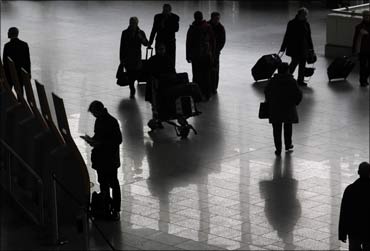 The world over, economies are beginning to look up: some quite rapidly while others at a rather sluggish pace. And employment generation too has begun at a healthy rate almost everywhere, barring a few hard-hit economies in Europe. While companies in India are on a hiring spree, as in many other Asian nations, it is interesting to note who the world's biggest employers are. Colossal organisations, both in the private as also the public sector, provide employment to millions of people across the world. So here is a list of list some giant enterprises which are the world's largest employers.
The world over, economies are beginning to look up: some quite rapidly while others at a rather sluggish pace. And employment generation too has begun at a healthy rate almost everywhere, barring a few hard-hit economies in Europe. While companies in India are on a hiring spree, as in many other Asian nations, it is interesting to note who the world's biggest employers are. Colossal organisations, both in the private as also the public sector, provide employment to millions of people across the world. So here is a list of list some giant enterprises which are the world's largest employers. 1. Wal-Mart Stores, US: 2,100,000
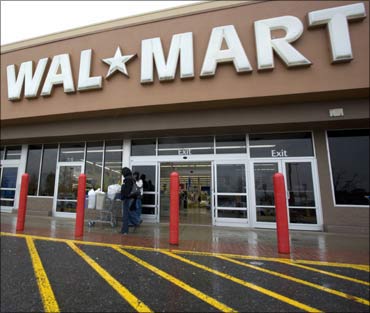 Wal-Mart Stores, Inc runs a chain of department stores across the globe. Founded by Sam Walton in Rogers, Arkansas in 1962, Wal-mart is the largest grocery retailer in the United States. It also owns and operates the North American company, Sam's Club. Wal-Mart operates in Mexico as Walmex, in the United Kingdom as Asda, and in Japan as Seiyu. It has wholly owned operations in Argentina, Brazil, Canada, and Puerto Rico. Wal-Mart's operations can be fragmented into three divisions: Wal-Mart Stores US, Sam's Club, and Wal-Mart International. The company does business in nine different retail formats: super centers, food and drugs, general merchandise stores, bodegas (small markets), cash and carry stores, membership warehouse clubs, apparel stores, soft discount stores and restaurants. Wal-Mart's operations have often come under the scanner for its huge foreign product sourcing, low employee health insurance enrollment, resistance to union representation, alleged sexism, etc.
Wal-Mart Stores, Inc runs a chain of department stores across the globe. Founded by Sam Walton in Rogers, Arkansas in 1962, Wal-mart is the largest grocery retailer in the United States. It also owns and operates the North American company, Sam's Club. Wal-Mart operates in Mexico as Walmex, in the United Kingdom as Asda, and in Japan as Seiyu. It has wholly owned operations in Argentina, Brazil, Canada, and Puerto Rico. Wal-Mart's operations can be fragmented into three divisions: Wal-Mart Stores US, Sam's Club, and Wal-Mart International. The company does business in nine different retail formats: super centers, food and drugs, general merchandise stores, bodegas (small markets), cash and carry stores, membership warehouse clubs, apparel stores, soft discount stores and restaurants. Wal-Mart's operations have often come under the scanner for its huge foreign product sourcing, low employee health insurance enrollment, resistance to union representation, alleged sexism, etc.
2. Indian Railways: 1,632,659
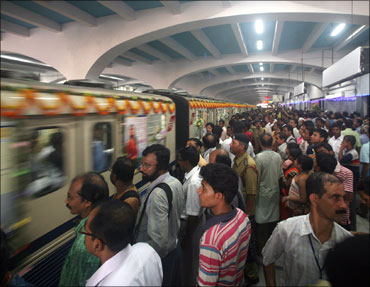 Indian Railways is the single largest employer in India and the fourth largest the world over, with 1.42 million employees. The state-owned Raliways are also on the verge of hiring more people soon.
Indian Railways is the single largest employer in India and the fourth largest the world over, with 1.42 million employees. The state-owned Raliways are also on the verge of hiring more people soon.Recently, Railway Minister Mamata Banerjee said that Indian Railways, one of the world's largest and busiest networks, will be filling up close to 170,000 vacant posts. Once that happens, Railways could well become the world's second largest employer. Indian Railways transports close to 20 million passengers everyday.
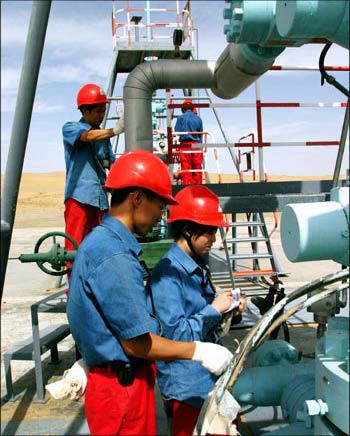 The China National Petroleum Corporation is a state-owned fuel-producing corporation and the largest integrated oil and gas company in the People's Republic of China.
The China National Petroleum Corporation is a state-owned fuel-producing corporation and the largest integrated oil and gas company in the People's Republic of China.CNPC, China's flagship energy enterprise, plays an important role in China's oil and gas production and supply. The company produces 2.75 million barrels of crude oil and 5.6 billion cubic feet of gas per day.
It has 3.06 billion metric tons of oil reserves and 2,320.1 billion cubic metres of gas reserve. CNPC's oil and gas production account respectively for 57.7 per cent and 78.3 per cent of China's total output.
In 2005, there were explosions at a CNPC owned petrochemical plant causing six deaths, a mass evacuation, and a massive oil spill over the Songhua River.
4. National Health Service, Britain: 1,626,000
 In Britain, one in every 23 persons from the working population, is employed by the National Health Service. Over 1.626 million people work for the NHS, making England a nation of health workers, if not that of shopkeepers. The number of NHS employees has constantly risen since the last 14 years, with as many as 59,000 people joining NHS in 2009 alone. The NHS employs 386,400 nurses, 109,000 doctors and 122,100 scientists and other therapists.
In Britain, one in every 23 persons from the working population, is employed by the National Health Service. Over 1.626 million people work for the NHS, making England a nation of health workers, if not that of shopkeepers. The number of NHS employees has constantly risen since the last 14 years, with as many as 59,000 people joining NHS in 2009 alone. The NHS employs 386,400 nurses, 109,000 doctors and 122,100 scientists and other therapists.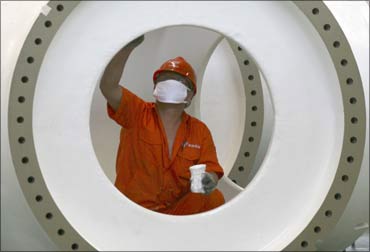 State Grid Corporation of China was founded on December 29, 2002 as a pilot state-owned corporation by the State Council. SGCC's core business is to build and operate power grids and provide power supply.
State Grid Corporation of China was founded on December 29, 2002 as a pilot state-owned corporation by the State Council. SGCC's core business is to build and operate power grids and provide power supply.The company has registered capital of RMB 200 billion yuan and service area covering 26 provinces. By the end of 2005, SGCC accumulated a total asset of RMB 1176.7 billion Yuan with a debt-asset ratio of 61.96 per cent, and possessed 195,899 km of 220KV and above transmission lines with a transforming capacity up to 616.64 GVA. SGCC serves 128 million customers.
6. Sinopec: 639,690
 Sinopec, or the China Petroleum and Chemical Corporation, is one of the major petroleum companies in China. Sinopec's business includes oil and gas exploration, refining, and marketing; production and sales of petrochemicals, chemical fibers, chemical fertilisers, and other chemical products; storage and pipeline transportation of crude oil and natural gas; import, export and import/export agency business of crude oil, natural gas, refined oil products, petrochemicals, and other chemicals.
Sinopec, or the China Petroleum and Chemical Corporation, is one of the major petroleum companies in China. Sinopec's business includes oil and gas exploration, refining, and marketing; production and sales of petrochemicals, chemical fibers, chemical fertilisers, and other chemical products; storage and pipeline transportation of crude oil and natural gas; import, export and import/export agency business of crude oil, natural gas, refined oil products, petrochemicals, and other chemicals.
7. Deutsche Post, Germany: 502,545 employees
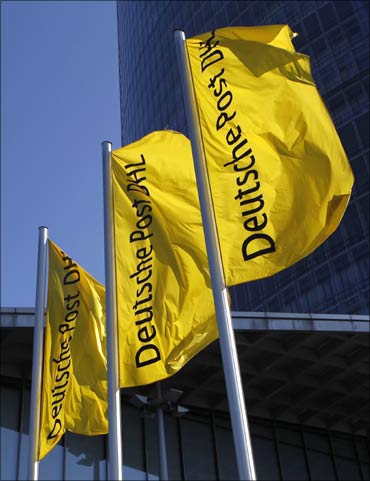 Deutsche Post -- also called Deutsche Post DHL -- is the world's largest logistics group, says Wikipedia.
Deutsche Post -- also called Deutsche Post DHL -- is the world's largest logistics group, says Wikipedia.Headquartered in Bonn, Germany, it employs 502,545 employees worldwide.
It boasts of revenues in excess of $100 billion. After the German mail body, Deutsche Bundespost, Deutsche Post was born. Over 30 per cent of its shares are held by Germany's KfW bank, and it is listed on DAX stock market.
8. Siemens Group, Germany: 461,000 employees
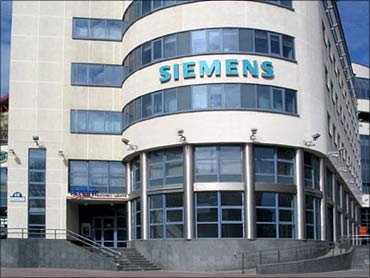 Europe's largest engineering fiant, Siemens, is a major multinational company. It employs over 461,000 people. It headquarters are located in Berlin, Munich and Erlangen.
Europe's largest engineering fiant, Siemens, is a major multinational company. It employs over 461,000 people. It headquarters are located in Berlin, Munich and Erlangen. Siemens is engaged in three major business sectors: industry, energy, and healthcare. Siemens is listed on the Frankfurt and New York stock exchanges.
 McDonald's Corporation, the world's largest chain of fast food restaurants, is also a major employment generator. Globally the burger chain employs close to 447,000 people.
McDonald's Corporation, the world's largest chain of fast food restaurants, is also a major employment generator. Globally the burger chain employs close to 447,000 people.McDonald's jobs are not very high paying and thus jobs that do not pay very well are at times referred to as McJobs. McDonald's restaurants typically offer burgers, chicken products, french fries, breakfast items, soft drinks, shakes, and desserts.
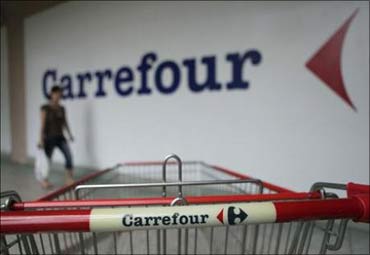 Carrefour is a French hypermarket chain with outlets worldwide. Carrefour means 'crossroads' in French. It is the largest hypermarket chain in terms of size, and the second largest retail group in revenue and third largest in profit after Wal-Mart and Tesco. Carrefour operates mainly in Europe, China, Colombia, Brazil, Argentina and in the Dominican Republic, but also has shops in North Africa and other parts of Asia.
Carrefour is a French hypermarket chain with outlets worldwide. Carrefour means 'crossroads' in French. It is the largest hypermarket chain in terms of size, and the second largest retail group in revenue and third largest in profit after Wal-Mart and Tesco. Carrefour operates mainly in Europe, China, Colombia, Brazil, Argentina and in the Dominican Republic, but also has shops in North Africa and other parts of Asia.
The first Carrefour store opened in June 1957, in suburban Annecy. The group was created by Marcel Fournier, Denis Defforey and Jacques Defforey and grew into a chain from this first sales outlet. In 1999 it merged with Promodes, known as Continent, one of its major competitors in the French market.
11. Compass Group, UK: 410,074
 Britain's Compass Group is a contract foodservice and support services multinational company. It is the world's largest contract foodservice company and has operations in over 50 countries, according to Wikipedia. Listed on the London Stock Exchange, the group employs over 410,000 people.
Britain's Compass Group is a contract foodservice and support services multinational company. It is the world's largest contract foodservice company and has operations in over 50 countries, according to Wikipedia. Listed on the London Stock Exchange, the group employs over 410,000 people. 12. United Parcel Service, US: 407,000
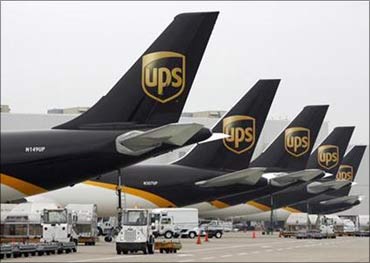 The United States Postal Service is an independent agency of the US responsible for providing postal service in the country.
The United States Postal Service is an independent agency of the US responsible for providing postal service in the country.
In the US, it is often referred to as the Post Office, Postal Service, or US Mail.
The USPS operates the largest civilian vehicle fleet in the world, with an estimated 260,000 vehicles.
The company's employees deliver mail at an average yearly cost of $235 per residence as of 2009.
Fierce competition from Internet, e-mail and private outfits like United Parcel Service and FedEx has forced USPS to adjust its business strategy and to modernise itself of late.
13. Foxconn, China: Over 400,000
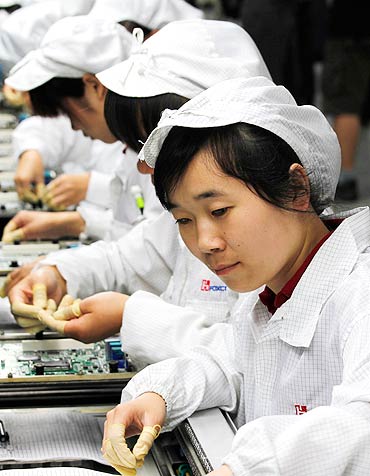 Foxconn is the world's biggest contract electronics maker. Terry Gou is the chairman of the $46-billion Taiwanese technology giant that employs over 400,000 workers.
Foxconn is the world's biggest contract electronics maker. Terry Gou is the chairman of the $46-billion Taiwanese technology giant that employs over 400,000 workers.Foxconn is part of Taiwan's Hon Hai Precision Industry Company.
Foxconn manufactures iPhones, iPads and spare parts for Apple Inc, desktop computers and parts for Hewlett-Packard and Dell, mobile phones for Motorola and other electronic goods for many other top brands, including Sony, Nokia and Microsoft.
Foxconn factories resemble mini-cities but its work ethics, managerial practices besides poor salaries were stated to be reasons for recurring suicides, which the company was unable to stem.
Newspaper reports have for long stated that Foxconn is a very secretive company which uses a dictatorial methods and military-style discipline to bullying its army of workers.
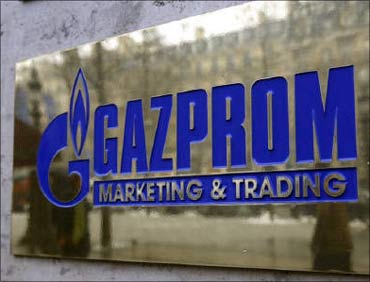 Gas giant Gazprom is the largest enterprise in Russia.In 1989, when the erstwhile USSR's ministry of gas industry was corporatised, Gazprom was born.
Gas giant Gazprom is the largest enterprise in Russia.In 1989, when the erstwhile USSR's ministry of gas industry was corporatised, Gazprom was born.Gazprom generates close to 20 per cent of the world's natural gas. It has gas and oil fields across the world. Gazprom has over 396,500 employees.
15. DaimlerChrysler, Germany: 382,724 employees
 The world's 13th largest car manufacturer, Daimler (earlier called DaimlerChrysler) employs over 382,700 people.
The world's 13th largest car manufacturer, Daimler (earlier called DaimlerChrysler) employs over 382,700 people.The company is known for its high precision and super-performance cars, trucks and buses. The company also has big interests in aerospace.
 Japanese technology and services multinational Hitachi has its headquarters in Tokyo.
Japanese technology and services multinational Hitachi has its headquarters in Tokyo.It is the world's third largest technological major in terms of revenue. The tech giant employs more than 355,800 people.
17. China Telecom Corp. Ltd: 285,105
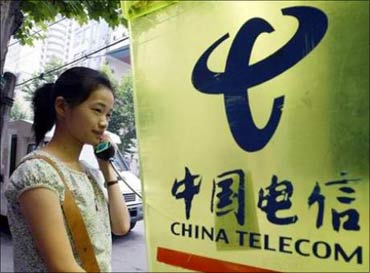 China Telecom Corp. Ltd. is the largest fixed line service and mobile telecommunication provider in the People's Republic of China.
China Telecom Corp. Ltd. is the largest fixed line service and mobile telecommunication provider in the People's Republic of China.As of April 2008, the company provided services to 216 million subscribers. The company was formerly a state-owned monopoly, but now divided into largely autonomous provincial branches.
China Telecom has been listed on the Hong Kong and New York stock exchanges since 2002, but the Chinese government still retains majority ownership.
 Some studies also take into account national armies as employers and going by that parameter China stands ahead of everyone else. The PLA would thus be the world's largest employer in the world. China, an economic superpower, is also a military powerhouse. People's Liberation Army, the Chinese army, employs over 2.255 million active personnel.
Some studies also take into account national armies as employers and going by that parameter China stands ahead of everyone else. The PLA would thus be the world's largest employer in the world. China, an economic superpower, is also a military powerhouse. People's Liberation Army, the Chinese army, employs over 2.255 million active personnel. 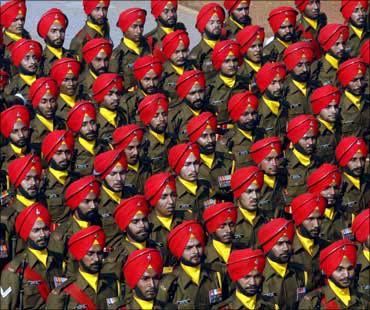 The Indian Army employs over 1,325,000 active personnel.
The Indian Army employs over 1,325,000 active personnel.The Indian Army is the world's second largest army after China. If taken along with business enterprises, the Indian Army would be the world's seventh largest employer.
This is just the land forces component of the Indian Armed Forces and does not take into account the Indian Air Force and the Navy.
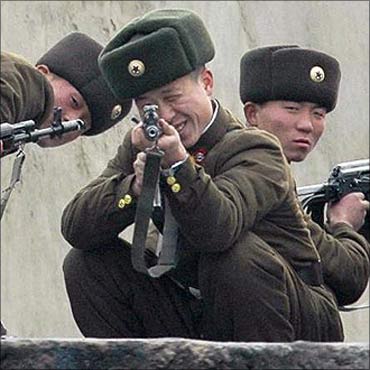
The Korean People's Army, also known as the Inmin Gun, employs over 1,106,000 active personnel, making it the world's third largest army.
21. Russian Army: 1,027,000
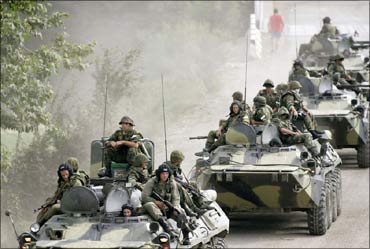
The Armed Forces of the Russian Federation employs about 1,027,000 troops.
22. US Army: 549,015
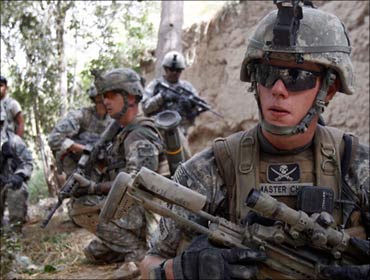 The United States Army is the branch of US armed forces that engages in land-based military operations. It employs over 549,000 soldiers.
The United States Army is the branch of US armed forces that engages in land-based military operations. It employs over 549,000 soldiers. Ref: http://www.rediff.com/business/slide-show/slide-show-1-the-worlds-biggest-employers/20101207.htm
Tuesday, December 7, 2010
South America's best-kept secret - Uruguay
 Expats are increasingly attracted to the charms of Montevideo
Expats are increasingly attracted to the charms of Montevideo After a decades-long pause, expatriates from rich countries are again arriving in Uruguay.
In 2009, for the first time in 44 years, the country saw a positive migration influx, while the number of applicants who got residence permits has tripled in only four years.
Immigration to Uruguay
- 3,825 residence permits were awarded in 2009, compared with 1,216 in 2005
- 50% of new legal residents come from Argentina and Brazil
- 288 Americans obtained their residence in 2009
- Europeans make 15% of new residents, with Germans and Spaniards leading the pack
Source: Uruguayan Office of Migration
Although most of the new legal residents come from neighbouring countries (half from Argentina and Brazil), the number of American and European applicants is also growing.
And even though the figures remain small, the arrival of hundreds of people from the northern hemisphere is starting to be noticed in this country of 3.3 million.
"If you look south of the US, Uruguay stands out for its clean water, good and healthy food, a good educational system, and good infrastructure, both in terms of roads and of internet access," Ronald Yoder, an American who just settled in the country, told the BBC.
Mr Yoder came to Uruguay in 2009, after Casey Research, an American investing newsletter he reads, rated the country as a good place to live in and invest.
This 64-year-old entrepreneur and investor decided to move to Piriapolis, a seaside resort situated an hour's drive from the capital, Montevideo.
"Start Quote
End Quote Paul Elberse Dutch expatIf more people knew that life here was so pleasant, they would come in hordes. I hope the secret doesn't leak or everyone will come "
For Paco Bermejo, a 44-year-old Spanish entrepreneur who came to Montevideo with his family last March to start a garden centre and landscaping business "in Uruguay, you feel optimistic about the future, something you don't find in Europe anymore".
"You get a better quality of life, more safety, easy-going people and good weather," he adds.
Michael Brown was transferred to Uruguay from California in 2005, and when it was time to go back, he decided to stay.
"You get good food, good wine, nice people, plus there is no rush-hour traffic, and I can get by speaking almost no Spanish at all," he told the BBC.
On the mapThis new trend is a result of a combination of elements, said Carlos Flanagans, director of consular affairs at the ministry of foreign affairs.
"Uruguay is a politically stable country, it is one of the few Latin American countries that was not affected by the economic crisis, and investors see it as an attractive option. Plus, in 2008, a pioneering migration law was passed that gives immigrants the same rights and opportunities that nationals have," he explains.
Juan Fischer, a local immigration and relocation lawyer, believes the economic crisis and tax increases in the US have made more Americans look overseas, "and that has translated into more people coming here".
 Expats say they get a better quality of life in the Uruguayan capital
Expats say they get a better quality of life in the Uruguayan capital On the phone from Las Vegas, where he was a speaker at the International Living Conference, Dr Fischer told the BBC that this organisation, which promotes relocation abroad, has put Uruguay on the map.
"Since 2005, Uruguay has been increasingly promoted as a place to live and retire. They all look for better quality of living at a lower cost.
"Uruguay looks attractive to them because it is a safe place. Also, they can better blend in compared to other Latin American countries, because our population is of European descent and we have got a large middle class," he adds.
The vast majority of Uruguay's population is of European descent, hundreds of thousands having arrived between the 1880s and the 1950s.
Then, economic downturns and a military government (between 1973 and 1985) turned Uruguay into a country of emigrants.
Now, it is quite easy for new immigrants to get a Uruguayan residence permit, Dr Fischer says.
"They are not required to invest or to buy property here. They just need to prove a monthly income of $650 (£413), which is not much for most foreigners; they need a certificate of good conduct and a birth certificate too."
Paul Elberse, a Dutch financial professional who came to Uruguay with his wife and children in 2002 for work reasons and decided to stay, says he does not understand why so few people come to live here.
"If more people knew that life here was so pleasant, they would come in hordes. I hope the secret doesn't leak or everyone will come," he half-jokes.
But Mr Yoder believes the word about Uruguay has already got out.
"When you find something good you tell other people about it. A lot of us are telling friends to come and visit. It [has become] a trend, and it is definitely a growing one," he said.
Friday, December 3, 2010
Dhoni Signed 26 Crore Endorsement Deal
The endorsement deal is for 3 year, with the country's largest spirit maker. Dhoni will do endorsement of Mcdowell Soda & also the whole UB Group.
With this Deal MS Dhoni came equal with Bollywood superstar Shah Rukh Khan in the endorsement.
 Mahendra Singh Dhoni was rated the world's highest paid cricketerby Forbes magazine He had earned $10 million last year.
Mahendra Singh Dhoni was rated the world's highest paid cricketerby Forbes magazine He had earned $10 million last year. Ref: http://indiascanner.com/ms-dhoni-signed-26-crore-endorsement-deal-28377

